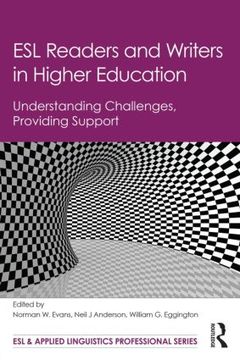ESL Readers and Writers in Higher Education Understanding Challenges, Providing Support ESL & Applied Linguistics Professional Series
Coordonnateurs : Evans Norman W., Anderson Neil J, Eggington William G.

ESL Readers and Writers in Higher Education describes the challenges ESL students in U.S. postsecondary institutions face when studying in a second language, and offers suggestions for how teachers, advisors, tutors, and institutions might provide support that meets the reading and writing needs of this very important student population.
Because the ESL profession as a whole, including what professionals are doing in the classroom, sits under the umbrella of an institutional response to a language-related challenge, some solutions aimed at helping students achieve optimal proficiency lie outside of the classroom. As such, this book is based on the assertion that language development support is not the sole responsibility of language teachers. Everyone on campuses that hosts ESL students bears some responsibility for these students' language development. Chapters are therefore, intentionally adapted to appeal to a wide variety of readers from classroom teachers, and teachers in training, to admissions officers, academic advisors, and international student advisors.
CONTENTS
Preface
Acknowledgements
Part I: Understanding Challenges
Chapter 1: Understanding Challenges, Providing Support―ESL Readers and Writers in Higher Education
Norman W. Evans, Brigham Young University & Maureen Snow Andrade, Utah Valley University
Chapter 2: Perceptions and Realities of ESL Students in Higher Education: An Overview of Institutional Practices
Maureen Snow Andrade, Utah Valley University; Norman W. Evans, Brigham Young University; K. James Hartshorn, Brigham Young University
Chapter 3: Focusing on the Challenges: Institutional Language Planning
William G. Eggington, Brigham Young University
Chapter 4: Writing Centers: Finding a Center for ESL Writers
Lucie Moussu, University of Alberta, Edmonton & Nicholas David, Divine Word College
Chapter 5: Writing Instruction for Matriculated International Students: A Lived Case Study
Tony Silva, Purdue University
Chapter 6: Familiar Strangers: International Students in the U.S. Composition Course
Elena Lawrick, Reading Area Community College & Fatima Esseili, University of Dayton
Chapter 7: Academic Reading Expectations and Challenges
Neil J Anderson, Brigham Young University – Hawaii
Part II: Providing Support
Chapter 8: Developing Self-Regulated Learners: Helping Students Meet Challenges
Maureen Snow Andrade, Utah Valley University, Norman W. Evans, Brigham Young University
Chapter 9: The Research-Instruction Cycle in Second Language Reading
William Grabe, Northern Arizona University & Xiangying Jiang, West Virginia University
Chapter 10: Supporting Multilingual Writers through the Challenges of Academic Literacy: Principles of English for Academic Purposes and Composition Instruction
Dana Ferris, University of California Davis
Chapter 11: Assisting ESP Students in Reading and Writing Disciplinary Genres
Fredricka L. Stoller, Northern Arizona University & Marin S. Robinson, Northern Arizona University
Chapter 12: Corpus-Based Vocabulary Support for University Reading and Writing
Mark Davies, Brigham Young University & Dee Gardner, Brigham Young University
Chapter 13: When Everything’s Right, but It’s Still Wrong: Cultural Influences on Written Discourse
William G. Eggington, Brigham Young University
Chapter 14: Using Technology to Teach ESL Readers & Writers
Greg Kessler, Ohio University
Chapter 15: Integrated Reading and Writing Assessment: History, Processes, and Challenges
Mark Wolfersberger, Brigham Young University – Hawaii & Christine Coombe, Dubai Men’s College
Contributors
Norman W. Evans is Associate Professor, Department of Linguistics and English Language, and Coordinator, English Language Center, Brigham Young University, USA.
Neil J Anderson is Professor, Department of English Language Teaching and Learning, Brigham Young University–Hawaii, USA.
William G. Eggington is Ludwig-Weber-Siebach Humanities Professor, Department of Linguistics and English Language, Brigham Young University, USA, and Visiting Professor, Kyung Hee University, Global Campus, South Korea.
Date de parution : 06-2015
15.2x22.9 cm
Date de parution : 06-2015
15.2x22.9 cm
Thèmes d’ESL Readers and Writers in Higher Education :
Mots-clés :
Neil Anderson; Norman Evans; William Eggington; English as a second language; ESL; higher education; ESL reading and writing; ESL education; reading; writing; challenges; support; TOEFL iBT; Young Man; ESL Reader; ESL Student; PCB Congener; ESL Writing; International ESL Student; Intensive English Program; ESL Section; Teach L2 Reading; EAP Program; TESOL Professional; L2 Writing; English Language Proficiency; EAP; ESL Tutorial; WC Tutor; ESP Instructor; ESP Instruction; Large Recognition Vocabulary; Undergraduate International Students; ESL Teaching Experience; Cross-cultural Pragmatic Failure; English Language Development; International ESL



